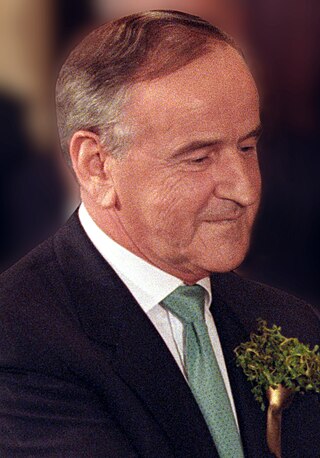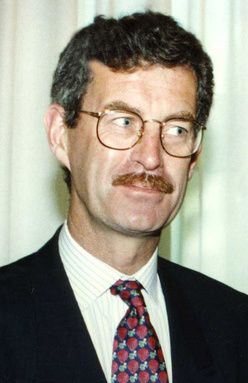Related Research Articles

Fine Gael is a liberal-conservative and Christian democratic political party in Ireland. Fine Gael is currently the third-largest party in the Republic of Ireland in terms of members of Dáil Éireann. The party had a membership of 25,000 in 2021. Simon Harris succeeded Leo Varadkar as party leader on 24 March 2024.

Alan Martin Dukes is an Irish former Fine Gael politician who served as Minister for Transport, Energy and Communication from 1996 to 1997, leader of the Opposition and leader of Fine Gael from 1987 to 1990, Minister for Justice from 1986 to 1987, Minister for Finance from 1982 to 1986 and Minister for Agriculture from 1981 to 1982. He served as a Teachta Dála (TD) from 1981 to 2002.

John Gerard Bruton was an Irish Fine Gael politician who served as Taoiseach from 1994 to 1997 and Leader of Fine Gael from 1990 to 2001. He held cabinet positions between 1981 and 1987, including twice as minister for finance. He was Leader of the Opposition from 1990 to 1994 and 1997 to 2001. He served as a Teachta Dála (TD) for Meath from 1969 to 2004.

The 2002 Irish general election to the 29th Dáil was held on Friday, 17 May, just over three weeks after the dissolution of the 28th Dáil on Thursday, 25 April by President Mary McAleese, at the request of the Taoiseach, Bertie Ahern. The general election took place in 42 Dáil constituencies throughout Ireland for 166 seats in Dáil Éireann, the house of representatives of the Oireachtas, with a revision of constituencies since the last election under the Electoral (Amendment) Act 1998.

Enda Kenny is an Irish former Fine Gael politician who served as Taoiseach from 2011 to 2017, Leader of Fine Gael from 2002 to 2017, Minister for Defence from May to July 2014 and 2016 to 2017, Leader of the Opposition from 2002 to 2011, Minister for Tourism and Trade from 1994 to 1997 and Minister of State at the Department of Labour and Department of Education with responsibility for Youth Affairs from 1986 to 1987. He served as Teachta Dála (TD) for Mayo West from 1975 to 1997 and for Mayo from 1997 to 2020.

The 1997 Irish general election to the 28th Dáil was held on Friday, 6 June, following the dissolution of the 27th Dáil on 15 May by President Mary Robinson, on the request of Taoiseach John Bruton. The general election took place in 41 Dáil constituencies throughout Ireland for 166 seats in Dáil Éireann, the house of representatives of the Oireachtas, under a revision in the Electoral (Amendment) Act 1995.

The 1992 Irish general election to the 27th Dáil was held on Wednesday, 25 November, almost three weeks after the dissolution of the 26th Dáil on 5 November by President Mary Robinson, on the request of Taoiseach Albert Reynolds following a defeat of the government in a motion of confidence. The general election took place in 41 Dáil constituencies throughout Ireland for 166 seats in Dáil Éireann, the house of representatives of the Oireachtas, under a revision in the Electoral (Amendment) Act 1990. Three referendums on abortion were held on the same date.

The 1981 Irish general election to the 22nd Dáil was held on Thursday, 11 June, following the dissolution of the 21st Dáil on 21 May by President Patrick Hillery on the request of Taoiseach Charles Haughey. The general election took place in 41 Dáil constituencies throughout Ireland for 166 seats in Dáil Éireann, the house of representatives of the Oireachtas. The number of seats in the Dáil was increased by 18 from 148 under the Electoral (Amendment) Act 1980.

The 1977 Irish general election to the 21st Dáil was held on Thursday, 16 June, following the dissolution of the 20th Dáil on 25 May by President Patrick Hillery on the request of Taoiseach Liam Cosgrave. The general election took place in 42 Dáil constituencies throughout Ireland for 148 seats in Dáil Éireann, the house of representatives of the Oireachtas, an increase of four seats. There was a significant revision of constituencies under the Electoral (Amendment) Act 1974. Jack Lynch led Fianna Fáil to a landslide election win, clearly defeating the outgoing Fine Gael–Labour government.

The 1973 Irish general election to the 20th Dáil was held on Wednesday, 28 February 1973, following the dissolution of the 19th Dáil on 5 February by President Éamon de Valera on the request of Taoiseach Jack Lynch. The general election took place in 42 Dáil constituencies throughout Ireland for 144 seats in Dáil Éireann, the house of representatives of the Oireachtas.

The Leader of the Opposition in Ireland is a de facto term sometimes used to describe the politician who leads the largest party in the Parliamentary Opposition in the lower house of the Irish Parliament, Dáil Éireann. In the Dáil, the Leader of the Opposition sits on the right-hand side of the Ceann Comhairle and directly opposite the Taoiseach. The role is not an official one and is not recognised in the Irish constitution, nor in legislation.

Brendan Howlin is an Irish Labour Party politician who has been a Teachta Dála (TD) for the Wexford constituency since 1987. He previously served as Leader of the Labour Party from 2016 to 2020, Minister for Public Expenditure and Reform from 2011 to 2016, Leas-Cheann Comhairle from 2007 to 2011, Deputy leader of the Labour Party from 1997 to 2002, Minister for the Environment from 1994 to 1997 and Minister for Health from 1993 to 1994. He was a Senator from 1983 to 1987, after being nominated by the Taoiseach.

Eamon Gilmore is a European Union diplomat, and an Irish former Labour Party politician. He serves as European Union Special Representative for Human Rights since February 2019. He is also the European Union Special Envoy for the Colombian Peace Process since 2015. He was Tánaiste and Minister for Foreign Affairs and Trade from 2011 to 2014, Leader of the Labour Party from 2007 to 2014, Chair of the Organization for Security and Co-operation in Europe from 2012 to 2013, Minister of State at the Department of the Marine from 1994 to 1997. He was a Teachta Dála for the Dún Laoghaire constituency from 1989 to 2016.

The 2011 Irish general election took place on Friday 25 February to elect 166 Teachtaí Dála across 43 constituencies to Dáil Éireann, the lower house of Ireland's parliament, the Oireachtas. The Dáil was dissolved and the general election called by President Mary McAleese on 1 February, at the request of Taoiseach Brian Cowen. The 31st Dáil met on 9 March 2011 to nominate a Taoiseach and approve the new ministers of the 29th government of Ireland.
Fine Gael is a political party in Ireland, formed in 1933 as a merger of Cumann na nGaedheal, the National Centre Party, and the Blueshirts.

The 2016 Irish general election to the 32nd Dáil was held on Friday 26 February, following the dissolution of the 31st Dáil by President Michael D. Higgins on 3 February, at the request of Taoiseach Enda Kenny. The general election took place in 40 Dáil constituencies throughout Ireland to elect to elect 158 Teachtaí Dála to Dáil Éireann, the house of representatives of the Oireachtas. There was a reduction of eight seats under the Electoral (Amendment) Act 2013.
The 31st Dáil was elected at the 2011 general election on 25 February 2011 and first met at midday on 9 March 2011 in Leinster House. The members of Dáil Éireann, the house of representatives of the Oireachtas (legislature) of Ireland, are known as TDs. It sat with the 24th Seanad as the two Houses of the Oireachtas.

The 2020 Irish general election took place on Saturday 8 February, to elect the 33rd Dáil, the lower house of Ireland's parliament. The election was called following the dissolution of the 32nd Dáil by the president, at the request of the Taoiseach, Leo Varadkar, on 14 January 2020. The members, Teachtaí Dála (TDs), were elected by single transferable vote in multi-seat constituencies. It was the first election since 1918 to be held on a weekend.
The events surrounding the formation of Ireland's government in 2016 took place during March, April and May of that year, following the general election held on 26 February, which failed to produce an overall majority for any of the country's outgoing political alliances and resulted in a hung parliament.

The 1994 Irish government crisis was a political event in the Republic of Ireland that occurred between November and December 1994. It saw the fracturing and eventual collapse of Taoiseach Albert Reynolds' governing coalition between Fianna Fáil and the Labour Party. However, no election was called and as a result, a new government was established between Fine Gael, Labour and Democratic Left, the first such change in government in Ireland's history.
References
- ↑ "'Labour's Way Or Frankfurt's Way' Latest". Broadsheet. 1 April 2011.
- "Letters to the Editor: Labour's way, Frankfurt's way - or back to the old ways". The Independent. Ireland. 1 November 2014.
- A Dark day for Labour
- Niall Stokes (28 May 2014). "Broken promises in a broken system". Hot Press. - 1 2 "Labour haunted by old slogans". The Independent. Ireland. 18 May 2012.
- ↑ Harry McGee (4 February 2011). "Gilmore vows to renegotiate 'bad deal' on EU-IMF bailout package". The Irish Times.
- ↑ "Irish election: Enda Kenny claims opposition victory". BBC News . 26 February 2011. Retrieved 7 November 2018.
- Doyle, Kilian (27 February 2011). "Fine Gael poised to lead next government as FF collapses". The Irish Times . Retrieved 7 November 2018.
- McDonald, Henry (27 February 2011). "Fianna Fáil trounced as Fine Gael and Labour set to form coalition". The Guardian . London. Retrieved 7 November 2018. - ↑ Vincent Browne (5 June 2012). "Tonight with #vinb: We now know Labour's way is Frankfurt's way". Magill.
- ↑ Fedayn (7 February 2013). "Frankfurt's Way". Rabble.
- ↑ Fergus Finlay (14 July 2015). "Dáil could lose its way without politicians of vision and principle". The Irish Examiner.
- ↑ Alan Kelly (23 February 2015). "Saying Labour hasn't delivered is just 'lazy media spin'". The Journal. Dublin.
- ↑ Adrian Grant (28 April 2013). "Labour's Way". Irish History Review. Archived from the original on 29 February 2016.